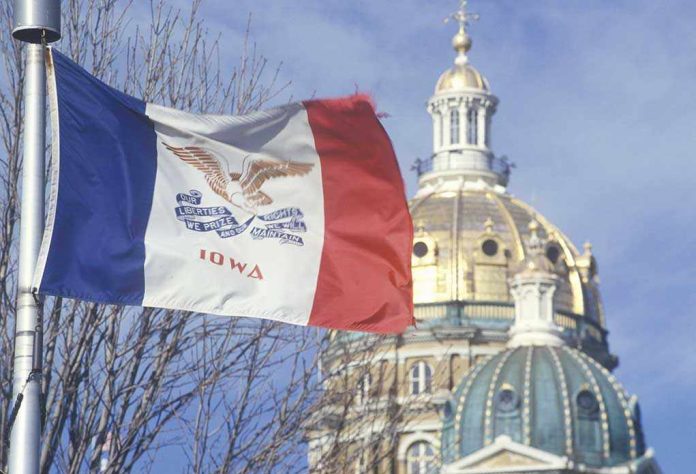
Governor Kim Reynolds’ proposal to deploy the Iowa National Guard for clerical support to ICE underscores state commitment to robust immigration enforcement, sparking debate.
Story Highlights
- Iowa National Guard poised to assist ICE with clerical tasks.
- Decision aligns with federal immigration enforcement efforts.
- Potential deployment emphasizes logistics over law enforcement.
- Proposal faces criticism from immigrant advocacy groups.
Iowa’s Role in Immigration Enforcement
Governor Kim Reynolds recently announced that the Iowa National Guard is prepared to assist U.S. Immigration and Customs Enforcement (ICE) with clerical and administrative support if requested. This marks Iowa as one of the first states to publicly offer such support, signaling a proactive stance in aiding federal immigration enforcement efforts. The move is framed as a logistical endeavor, focusing on processing rather than direct enforcement, highlighting Iowa’s alignment with national GOP priorities on immigration.
The potential deployment comes amidst a broader multi-state initiative aimed at bolstering federal capabilities in the face of mass deportation plans under the Trump administration. Discussions between Iowa, the Department of Homeland Security, and other states are ongoing, with specifics regarding the number of troops and their duties still being negotiated. This initiative reflects a significant shift towards state involvement in federal immigration policies, emphasizing administrative roles over combat or law enforcement tasks.
Controversy and Criticism
The proposal has drawn criticism from immigrant advocacy groups, citing concerns over civil liberties and the militarization of immigration enforcement. Groups like Escucha Mi Voz Iowa argue that deploying the National Guard in support of ICE’s administrative functions sets a concerning precedent, potentially infringing on the rights of immigrant communities. These organizations have threatened to mobilize against the proposal, highlighting the social and political tensions surrounding immigration policies.
Governor Reynolds, however, remains steadfast in her approach, emphasizing that the state’s involvement is primarily logistical. She has stated that Iowa is prepared to step up and assist in managing the logistical and processing aspects, ensuring that the focus remains on administrative support rather than direct enforcement activities. This stance aligns Iowa with federal priorities, reinforcing its commitment to addressing immigration challenges head-on.
Implications for Iowa and Beyond
The potential deployment of the Iowa National Guard for clerical support could have significant implications for both the state and the broader national landscape. In the short term, it may heighten anxiety among immigrant communities and exacerbate political divisions. Long-term effects could include setting a precedent for similar involvement by other states, influencing future policies and potentially prompting legal challenges from civil liberties groups.
Economically, the move could lead to labor disruptions if deportations increase, particularly impacting sectors like agriculture and food processing that rely heavily on immigrant labor. Politically, it positions Iowa firmly within national GOP immigration strategies, potentially making it a focal point in upcoming elections. As debates continue, the nation watches closely to see how this collaboration unfolds and its broader implications on immigration enforcement.




